Ginger Garlic paste is a cornerstone of many Indian recipes. While I’ll typically just mash or crush the garlic and ginger called for in a given recipe, I’ve found that keeping some on hand in the fridge helps to streamline meal preparations. Try this simple Garlic Ginger Paste recipe for yourself and set your fridge up for several weeks’ worth of cooking success!
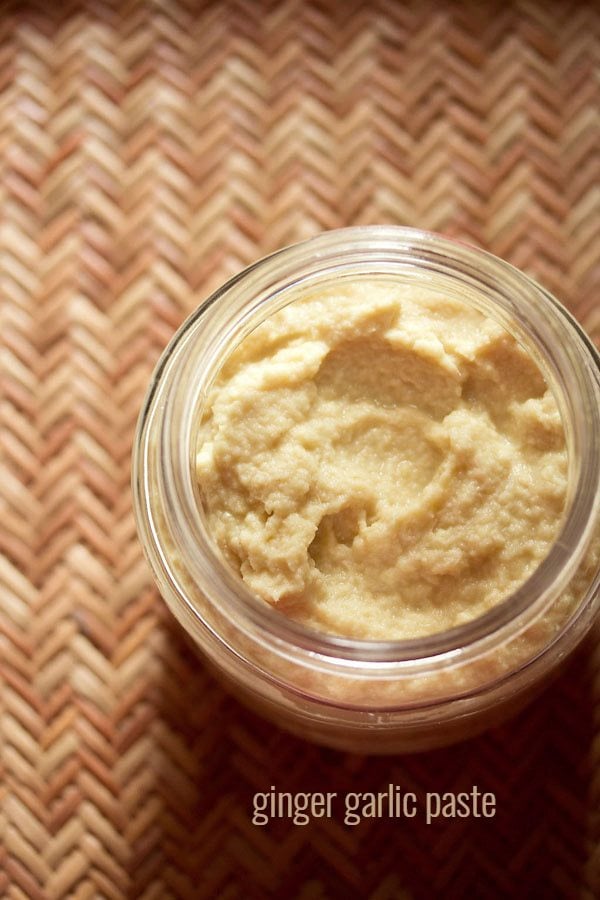
About Ginger Garlic Paste
Ginger Garlic Paste is nothing but both ginger and garlic crushed to a fine paste together and bottled. It is one of the essential ingredient added to many Indian recipes.
The recipe shared here is my mom’s version. She always makes ginger garlic paste and keeps it in the fridge. I personally don’t usually make this paste ahead of time, rather just use the ingredients as I need them.
I have to admit, though, that having the paste makes life a bit easier and also saves time while cooking. I just need to get the paste from the fridge to add to the recipe, no need for peeling, chopping, and then crushing the ginger-garlic. If you like to plan ahead, you’ll love this recipe.
Making the paste is easy, but peeling garlic feels like a never-ending task. I have tried the 2-bowl shaking method to get the peels come off easily, but it did not work for me. As such, I peeled them the traditional way, removing each peel one by one.
Of course, you can lightly crush or mash the garlic first to help you remove the peels, but peeling one by one suits me. So, when you have extra time, do this zen-like task.
You can also do this chore when watching tv or listening to music. Peeling garlic requires practice and patience. I suggest you meditate when peeling to make the time more productive. 🙂
Some people might have a burning sensation on their fingers while peeling the garlic. You can rub some oil on your hands to prevent the burning, but the flip side of this is that the peels stick to the oiled fingers.
That said, it’s still better than feeling the burning sensation several hours later. This burning sensation stays for a few hours or sometimes up to a day and then goes away. You could also wear gloves and peel the garlic cloves.
I have used an equal amount of ginger and garlic by weight. Please note that after peeling them, the weight did change significantly.
I used 250 grams of garlic and after peeling I was down to 186 grams of garlic. From 250 grams of ginger, I ended up with just 190 grams of ginger after peeling and chopping.
Make sure to account for some dried or wilted garlic cloves and a few ginger roots bruised or not in a good condition.
How to make Ginger Garlic Paste
1. First separate the garlic cloves from 250 grams of garlic. Then peel the garlic cloves and set aside.
While peeling, discard garlic cloves that have wilted, dried or have black powder like substance on them or you see some black spots on them.
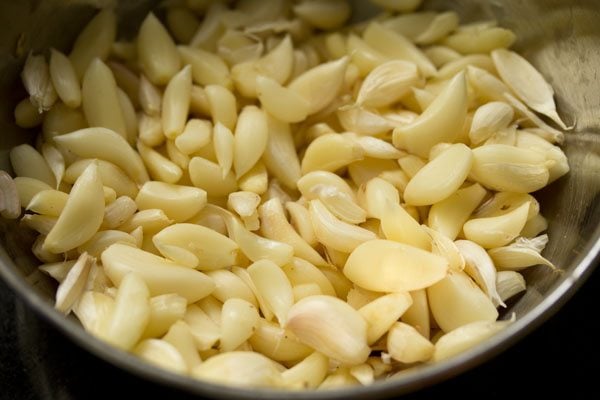
2. Rinse 250 ginger roots a few times in water scrubbing the mud lodged in them with a brush if needed.
Then peel them. Use a paring knife or the back of a spoon to peel them.
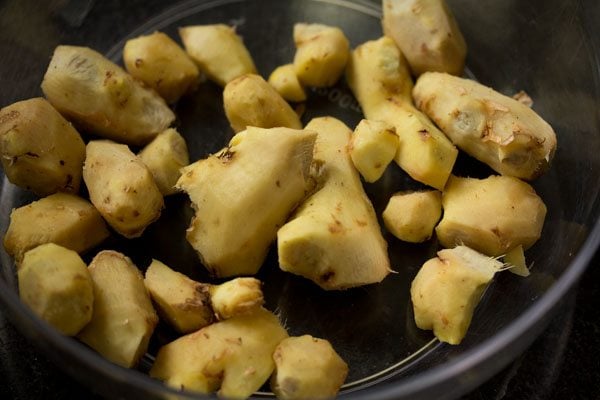
3. Then roughly chop the ginger and add it to the bowl containing the garlic cloves. Rinse again very well in warm water a few times. Drain all the water.
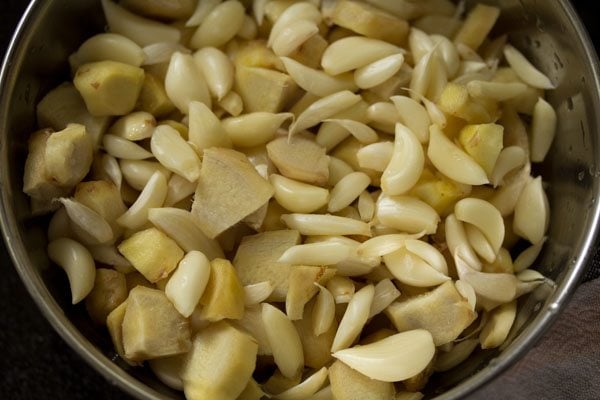
4. Add them to a grinder jar or a high speed blender or a food processor with edible rock salt and oil. Both salt and oil help to preserve the paste and prevent oxidization.
Just keep in mind to add less salt to any recipe that you make using this ginger garlic paste since the paste already has some.
You do not need to any water while grinding or blending.
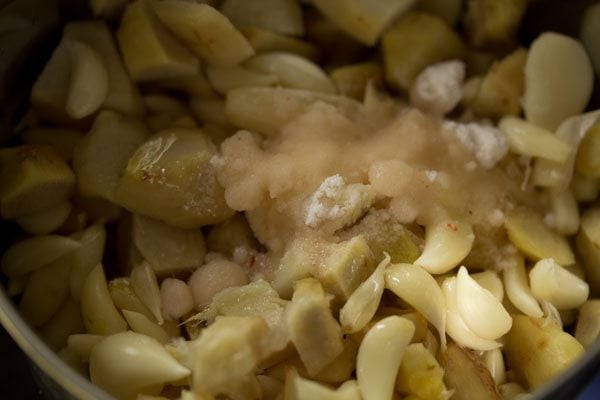
5. Grind or blend or process to a smooth and fine consistency making sure that there are no small chunks of either the ginger or garlic.
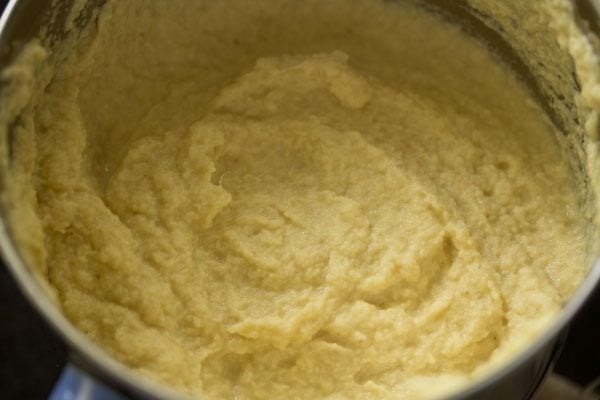
6. Transfer the prepared ginger garlic paste to a clean glass jar. Close the lid and refrigerate.
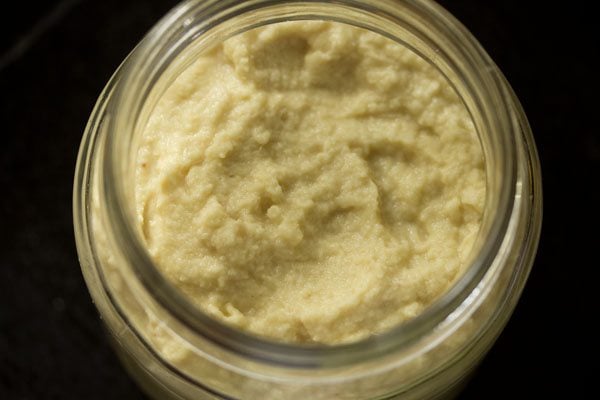
Storage and Uses
7. Use Ginger Garlic Paste as required in any recipe that you make. This paste stays good for about 3 to 4 weeks in the refrigerator. You can also freeze it. On freezing it keeps well for about 2 months.
When removing the paste, always use a clean dry spoon. Any water or moisture if seeped into the paste, will spoil it.
Take the amount as needed for your recipes. Seal the jar with its lid and place back again in the fridge.
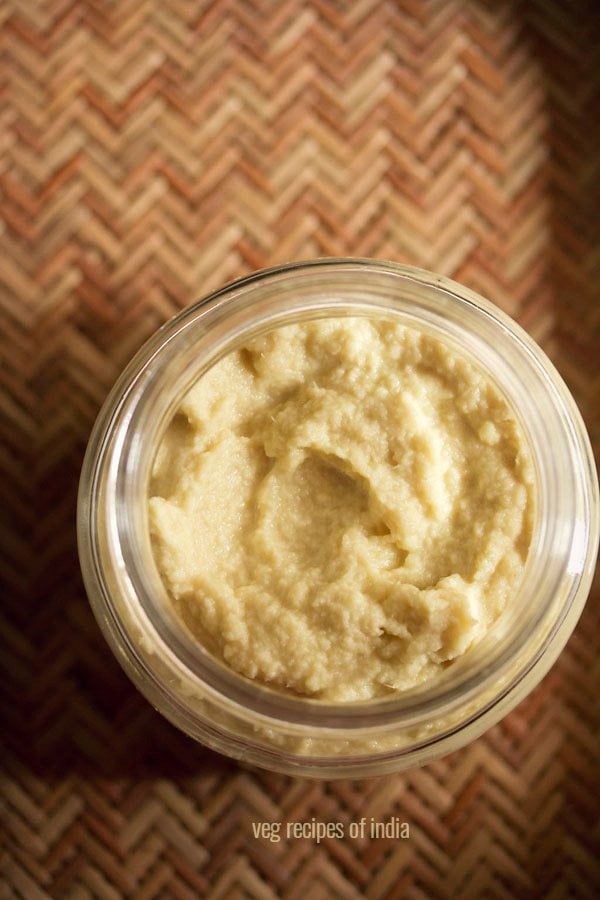
Expert Tips
- Use garlic which has medium to large cloves and thus peeling them is easier. Small to very small garlic cloves take a lot of time. But on the contrary smaller sized garlic pods or cloves are more pungent and more flavorful compared to their larger counterparts.
- Avoid fibrous or dry or dense ginger. Use fresh and tender ginger. If the ginger smells awful, then discard them.
- Peel ginger quickly using the back of a spoon. You can also use a small knife or a paring knife.
- Use both fresh ginger and fresh garlic. Kindly do not use frozen garlic or ginger. Also refrain from using store-brought packaged peeled garlic as using these may reduce the shelf life of your homemade paste and the paste can get spoiled quickly.
- Both salt and oil act as preservatives and the color does not discolor or darken. Some people also add turmeric powder.
- You can add 1 to 2 tablespoons of oil to cover the top of the ginger-garlic paste in the jar to help prolong the shelf life.
FAQs
The consistency in a ginger-garlic paste largely depends upon the type of device you use to grind. A food processor may not give as smooth of a consistency as using a mixer-grinder or a high speed blender.
If the aroma of the paste is good, then you can use it for a few months. If the color changes or darkens or it has an off odor, then you can get rid of the paste.
The ratio of ginger to garlic which is 1:1 is what most people follow and one which I also follow. But then again it depends on personal preferences.
Feel free to increase the garlic and use a proportion of 1:2 or inversely use a proportion of 2:1 for the ginger and garlic respectively.
I would suggest to make a small batch using your proportions. While making Indian food, use the homemade ginger garlic paste and see how does your recipe or dish tastes. If has too much of a garlic flavor or more of the ginger flavors, then change the proportions accordingly.
More DIY Indian Recipes
Please be sure to rate the recipe in the recipe card or leave a comment below if you have made it. For more vegetarian inspirations, Sign Up for my emails or follow me on Instagram, Youtube, Facebook, Pinterest or Twitter.
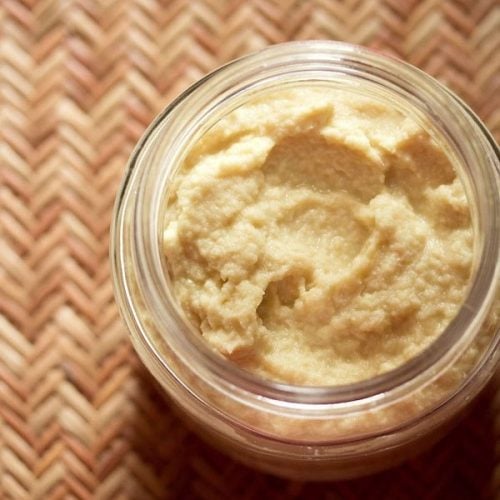
Ginger Garlic Paste Recipe
Ingredients
- 250 grams ginger – after peeling yield is 190 grams ginger or 1.35 cups ginger chopped in large chunks
- 250 grams garlic cloves or 13 to 14 small to medium sized garlic bulbs – after peeling yield is 186 grams garlic or 1.25 cups peeled garlic
- 2 teaspoon rock salt – edible and food grade, or add regular salt or sea salt or pink salt
- 3 tablespoons oil – can use sunflower oil or peanut oil or any neutral tasting oil
Instructions
Preparation
- Peel the garlic cloves. Take them in a bowl.
- While peeling, discard garlic cloves that have wilted, dried or have black powder like substance or black spots on them.
- Rinse the ginger roots and then peel them. Then roughly chop them
- Add the chopped ginger to the bowl containing the peeled garlic cloves. Rinse them again very well in warm water a few times. Drain all the water.
Making Ginger Garlic Paste
- Add them in a grinder jar or food processor or a high speed blender.
- Also add rock salt and oil. Both salt and oil help in preserving the paste and it does not turn dark too. Just do keep in mind to add less salt in any recipe that you make using this ginger garlic paste.
- Grind or process or blend to a smooth and fine consistency. Make sure there are no small chunks of either the ginger and garlic in the ground paste.
- You don't need to add any water while grinding or blending.
- Transfer the prepared paste in a clean glass jar. Close the lid and refrigerate.
Storage and Uses
- You can either opt to refrigerate or freeze the homemade ginger garlic paste. Use a clean, dry glass jar to store the paste.
- In a refrigerator the paste keeps well for about 3 to 4 weeks. In the freezer for 1 to 2 months.
- While removing the paste, always use a clean dry spoon. Take the paste as needed and then close the jar tightly with its lid and keep back again the refrigerator.
- Use ginger garlic paste as required in any recipe that you make.
Notes
- Use fresh and tender ginger. Always peel the ginger and rinse them well.
- Ensure to use fresh garlic cloves separated from the garlic pod. Kindly do not use frozen garlic or store brought peeled garlic. It is better to peel the garlic yourself. Also do not use garlic chives.
- I usually make small batches and store the ginger-garlic paste. According to your needs, you can make less or more quantities of the paste.
- Note that the approximate nutrition info is for the entire amount of ginger garlic paste made with this recipe.
Nutrition Info (Approximate Values)
This Ginger Garlic Paste recipe from the archives, originally published in July 2016 has been updated and republished on January 2023.
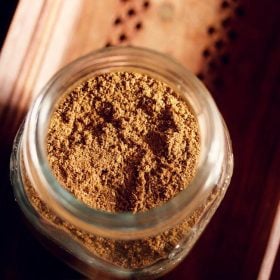
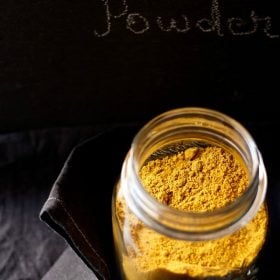
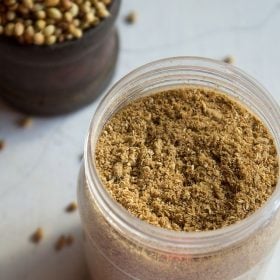
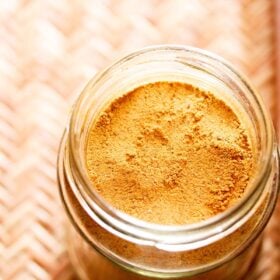
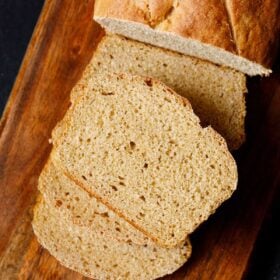
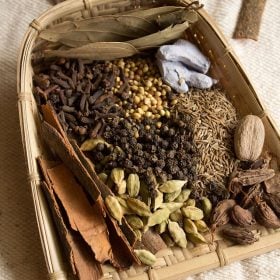
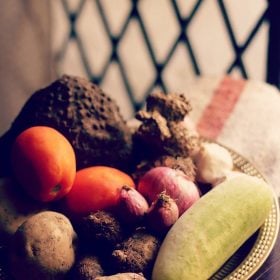
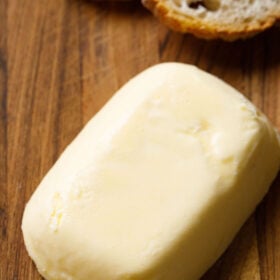








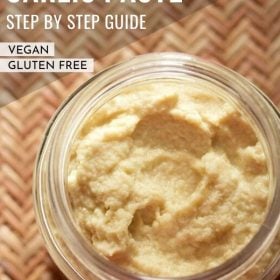
It is a good recipe overall, just more things can be added apart from rock salt and turmeric and more oil is needed to emulsify the paste.
But, congrats for this invention, I cannot imagine my cooking without a ginger garlic paste anymore, being trained and supervised by an Indian Chef for about 10 years now.
This is the basic ginger garlic paste recipe that many Indian homemakers makes, but yes customizations are possible in this one. Thanks for the comment and the rating.
Thank you for making this and showing the step by step pictures. I’ve never made it before and have been looking for a recipe most of them don’t look as paste like as yours. I think the main difference is the use of a grinder vs a food processor. Your looks lovely and smooth, I am definitely going to try it. One question, I had read that if you add olive oil to garlic and ginger paste and then store it, it can develop botulism? Is that true? Some said the only time to add oil to it is when you are going to use it right away. Now I read your bio and I’m positive with your food science degree that you would have the answer. Thank you again, I have never peeled ginger before and was a little unsure exactly what it should look like after and your pictures help me greatly.
thank you leanne. the consistency in a ginger-garlic paste largely depends upon the type of device you use to grind. a food processor won’t give a smooth consistency. in ginger-garlic paste, salt is added which reduces the risk of the bacteria growing. moreover, the paste has to be refrigerated and not kept at room temperature. in indian cooking, oil is largely used as a preservative. we make plenty of pickles & chutneys that are preserved for some months to a year. ground spices, salt, sugar and oil added to these pickles and chutneys help to preserve them and increase their shelf life. when making the paste, i would suggest using oils like peanut oil or sunflower oil. olive oil may not go well in the paste in terms of flavor.
you can safely make a batch and refrigerate. if still, you are in doubt, then fresh ginger and fresh garlic cloves can always be crushed in a mortar-pestle. hope this helps. glad to know the pictures are helpful.
Hie,
I am using ready-made
ginger garlic paste.
I don’t know how to preserve it. Can you advise something?
And how long should we use it after opening the jar.”
ready made ginger garlic paste will have preservatives, so it will stay well for some months. keep in the fridge after you open the bottle. if the aroma of the paste is good, then you can use it for a few months. if the color changes or darkens or it has an off odour, then you can get rid of the paste.
Cn i use olive oil to make the paste?
Vibhuti, yes you can use olive oil.
Do I have to keep the paste in freezer or fridge? How long willi it last in the fridge?
in the fridge. 1 month.
HI ,
I have noticed that whenever I make garlic paste and 2 or 3 days it becomes greenish colour though the smell remain same
what could be the reason and how do I get rid of that colour change .
Do you have any idea ?
no idea why. add some salt and oil while making the paste and see if the color changes.